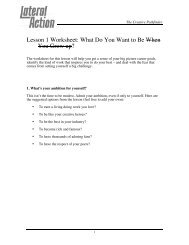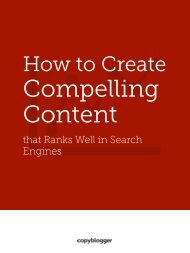Content Marketing Research
You also want an ePaper? Increase the reach of your titles
YUMPU automatically turns print PDFs into web optimized ePapers that Google loves.
<strong>Content</strong><br />
<strong>Marketing</strong><br />
<strong>Research</strong><br />
The Crucial First Step
CONTENT MARKETING RESEARCH: THE CRUCIAL FIRST STEP<br />
<strong>Research</strong>: The Crucial First Step<br />
Copyright © 2013 Copyblogger Media, LLC<br />
All Rights Reserved<br />
Feel free to email, tweet, blog, and pass this ebook around the web ... but please<br />
don’t alter any of its contents when you do. Thanks!<br />
copyblogger.com<br />
2
CONTENT MARKETING RESEARCH: THE CRUCIAL FIRST STEP<br />
Let’s face it — doing research might not be as fun as creating killer headlines,<br />
writing the first draft of a genius blog post, or crafting your next irresistible offer.<br />
But solid research is essential if you truly want to be successful as a content<br />
marketer.<br />
When you hear the word “research” in conjunction with content marketing, you<br />
might immediately think about keywords (and optimizing your content for<br />
search engines using those keywords.)<br />
And yes — keyword research is incredibly important. Mostly because it’s the<br />
language of your audience — even if search engines didn’t exist.<br />
But to really dig into your research, you need to start thinking beyond just<br />
search engine optimization research. You need to think bigger.<br />
Your audience is online right now, searching for things they want to discover<br />
more about, and looking for real-time answers to their questions. They’re also<br />
socializing online in LinkedIn groups, Google+ circles, and Twitter chats.<br />
So, it makes sense … your best research will come from the digging around and<br />
exploring in the places where your audience is socializing and searching.<br />
You need to find out what really makes your prospect tick. You have to figure<br />
3
CONTENT MARKETING RESEARCH: THE CRUCIAL FIRST STEP<br />
out their frustrations, understand their desires, and find out what problems keep<br />
them up at night.<br />
This all sounds great on paper, right? You’re nodding and smiling and saying, “Of<br />
course!”<br />
But research is the often-ignored, frequently avoided red-headed stepchild of<br />
content marketing.<br />
What good research does for you (and your readers)<br />
When you do research well — when you build a solid foundation for your<br />
content marketing efforts — you can build a complete profile of your ideal<br />
client, and how that person thinks, feels, and buys.<br />
This profile shapes everything you do online.<br />
Solid research means your copy practically assembles itself. Your content will<br />
be easier to put together because you know your audience so well that you can<br />
speak directly to them without a lot of stress or strain.<br />
Writer’s block will disappear, and your biggest problem will be trying to find the<br />
time and energy to crank out all the high-value blog posts and articles that you<br />
know your customers want and need.<br />
4
CONTENT MARKETING RESEARCH: THE CRUCIAL FIRST STEP<br />
Good research also leads directly to more clickthroughs, better opt-in rates,<br />
more social media shares, better search engine rankings, and more conversions.<br />
Your content marketing metrics improve because research helps you speak<br />
directly to your ideal client — in the language they understand, and in a voice<br />
they will trust and want to buy from.<br />
When you research thoroughly, you’ll be able to anticipate what your customers<br />
need — even before they really know they need it. Your relationships with your<br />
readers and clients will be better, because your thorough investigations (via<br />
social and search) make you look like a mind-reading genius.<br />
And bonus points to you if you got the Ice Cube reference in the headline.<br />
A guide to mastering the art of research<br />
So how can you do better (and more efficient) research, even if it’s not your<br />
favorite thing?<br />
In <strong>Content</strong> <strong>Marketing</strong> <strong>Research</strong> 101, we’ll take this typically unsexy topic and turn<br />
it around.<br />
In this ebook, you’ll learn:<br />
••<br />
What you should be researching<br />
5
CONTENT MARKETING RESEARCH: THE CRUCIAL FIRST STEP<br />
••<br />
Where to find the tools you need to make the research process faster,<br />
better, and more interesting<br />
••<br />
The most important thing to consider before doing any research (it’s not<br />
what you think!)<br />
So let’s get to it ...<br />
6
CONTENT MARKETING RESEARCH: THE CRUCIAL FIRST STEP<br />
A 6-Step <strong>Content</strong> <strong>Marketing</strong> <strong>Research</strong><br />
Process<br />
by Beth Hayden<br />
Professional athletes log thousands of hours in the gym preparing for<br />
competitions on the field, court, bike or ski run.<br />
Athletes can’t be great at what they do without putting in that critical<br />
preparation time in the gym.<br />
It’s the work that most people never see — all those hours of workout time —<br />
that makes the difference between a good athlete and a truly great one.<br />
In the world of content marketing, you need to think of yourself as an athlete.<br />
Your market research is your training — it’s what you have to do, day by day and<br />
week by week, in order to be great at what you do.<br />
Most of the time when we talk about “work” in our world, we’re talking about<br />
writing content, creating products, managing social media or email campaigns,<br />
answering emails, and taking care of our customers.<br />
But before we can do any of that, we need to get prepared. And we get prepared<br />
by doing our research (see: Chapter 1).<br />
7
CONTENT MARKETING RESEARCH: THE CRUCIAL FIRST STEP<br />
So what should your research process look like? What steps can you take to<br />
gather the best possible data on your target audience?<br />
1. Get (truly) motivated<br />
Doing market research helps you better understand what your community<br />
needs, and that information allows you to help your audience in totally unique<br />
ways.<br />
Getting the inside track on how your audience thinks (and what it needs) not<br />
only allows you to create perfectly targeted content, but it allows you to create<br />
products and services that solve very specific problems.<br />
And yes, that puts cash in your pocket.<br />
But I’ll bet money isn’t the only reason you started your business. I’ll bet you<br />
started your company because you genuinely want to help people.<br />
So remember why you need to do market research. We do our research so we<br />
can help people them solve their problems and enable them to live better, fuller,<br />
richer lives.<br />
If you let truly important motivations light a fire under you — rather than<br />
just visions of big payouts — your research process will be a lot easier (and<br />
considerably more fun.)<br />
8
CONTENT MARKETING RESEARCH: THE CRUCIAL FIRST STEP<br />
2. Be a part of the community you’re researching<br />
The best (and easiest) way to do audience research is to be an integral member<br />
of your own market.<br />
So if you’ve got your own blog, and you have readers who regularly chime in<br />
with opinions, questions, complaints and insights, you can gather fantastic<br />
market data from that community.<br />
If you don’t have your own audience yet, you can participate on other websites<br />
and blogs that attract the audience you’re trying to connect with.<br />
Join the community you’re trying to serve. Take part in discussions and<br />
conversations via social networking sites, blogs, forums and other online groups.<br />
Give freely and generously. Answer questions. Participate. Ask nothing in return<br />
when you’re a new member of the community — just provide helpful insight to<br />
other members of that tribe.<br />
And as you’re participating and helping other community members, you can<br />
learn a lot by watching and learning.<br />
3. <strong>Research</strong> your audience’s mindset<br />
The first thing you need to study is your audience’s mindset — the way they look<br />
9
CONTENT MARKETING RESEARCH: THE CRUCIAL FIRST STEP<br />
at the world.<br />
What’s important to them? What types of people do they admire? What are their<br />
values?<br />
Tools like LinkedIn, Pinterest, Twitter, Google+ and Facebook let you gather<br />
information about audience mindset by letting you eavesdrop on their digital<br />
worlds (NOT in a creepy way). These online tools give you a daily peek into what<br />
people do and say every day — and that stuff is market research gold.<br />
You can also do keyword research to discover more about the way your market<br />
looks at the world. Use keyword research tools like WordTracker and Google<br />
Keyword searches to find out everything you can about the topics your audience<br />
is interested in and the things they want to know more about.<br />
Yes, keyword research is important for search engine optimization, but it’s also<br />
some of the best market research around.<br />
4. Discover your audience’s problems<br />
When conducting market research, you’re also trying to find out what your<br />
prospects’ problems are — all those annoyances and complaints, all the whining<br />
and whinging.<br />
You can discover not only the problems that are keeping them up at night, but<br />
10
CONTENT MARKETING RESEARCH: THE CRUCIAL FIRST STEP<br />
the inconsistencies and troubles with your competitor’s problems and services,<br />
too.<br />
You can discover what’s not being done well in your industry — and how you<br />
can handle it better.<br />
Discovering unsolved problems or dissatisfaction gives you the opportunity to<br />
satisfy needs no one else can, because you have information they don’t have (or<br />
haven’t noticed yet.)<br />
So use social media eavesdropping and keyword research (as well as traditional<br />
market research tools like surveys, interviews and focus groups) to discover<br />
people’s problems.<br />
Then use the insight you gain to create content that speaks directly to your<br />
audience in a way no one else can.<br />
Your readers and customers want content that addresses their needs and<br />
desires, and talks to them in a way that resonates with who they are and how<br />
they look at the world.<br />
When you do market research consistently and well, you will know exactly what<br />
kind of content your audience needs and wants. And that knowledge gives you<br />
a totally unfair (and completely awesome) advantage in your market.<br />
11
CONTENT MARKETING RESEARCH: THE CRUCIAL FIRST STEP<br />
5. Train consistently<br />
Remember that market research (just like training workouts for athletes) is<br />
never a one-time event. It’s an ongoing process that you will need to finesse<br />
and tweak, revamp and redo — just like everything else about your content<br />
marketing strategy.<br />
So plan to do market research regularly. Make it part of your weekly and<br />
monthly content marketing routines.<br />
When you’re planning how to spend your workweek, structure your schedule<br />
to build in time for watching and learning. Make it a top priority. It’s one of the<br />
most important things you can do to set your business up for success.<br />
Without market research, you’ll just be one of thousands of business owners<br />
trying to take their best guess about what their customer needs. If you<br />
consistently do the research, you’ll know exactly what they need — and be<br />
perfectly positioned to deliver it to them.<br />
6. Embrace the work<br />
As content marketers, many of us think of market research as an afterthought —<br />
something that we have to laboriously slog through in order to get to our actual<br />
work of creating products, online content, educational programs and sales<br />
pages.<br />
12
CONTENT MARKETING RESEARCH: THE CRUCIAL FIRST STEP<br />
But if we don’t do our market research, all our other work will be fall flat. It’s<br />
critical that we discover everything we can about the people we’re trying to<br />
reach, and listen to what they’re trying to tell us.<br />
Market research is hard because it is messy. You have to wade through ungodly<br />
amounts of noise in order to get to the useful nuggets of information that help<br />
you understand your audience.<br />
Sifting through all that noise is annoying and tiresome. It’s hard.<br />
But we have to embrace this work — even if it’s hard. In fact, it’s specifically<br />
because it’s hard that it’s one of the best things for us to do.<br />
Because it’s difficult, it’s likely that our competitors aren’t doing it — or aren’t<br />
doing it well.<br />
And that gives us a spectacular advantage on the competition field. So make<br />
sure to pull on those sneakers and get your butt to the gym.<br />
It’s probably the most important thing you’ll do all day.<br />
13
CONTENT MARKETING RESEARCH: THE CRUCIAL FIRST STEP<br />
Become a <strong>Content</strong> <strong>Marketing</strong> Secret Agent<br />
with Competitive Intelligence<br />
Who wouldn’t want to become a secret agent like Jack Bauer, Ethan Hunt, and<br />
Perry the Platypus? We all want cool gadgets, sexy entourages, and glamorous<br />
gigs.<br />
More importantly, we want to be secret agents because they always have inside<br />
information.<br />
And as a content marketer, you can get the secret scoop on your competitors by<br />
doing a little high-tech spying.<br />
Using slick online snooping techniques and a little sweat equity, we can all find<br />
out what our competitors are doing well, what they could be doing better, and<br />
how we can adapt their best techniques to improve our own businesses.<br />
Let’s go looking …<br />
Why you need to find out what your competitors are<br />
doing<br />
We can find out what products our competitors are creating, what content is<br />
doing well on their websites, and how they’re ranking in the search engines.<br />
14
CONTENT MARKETING RESEARCH: THE CRUCIAL FIRST STEP<br />
Competitive research lets us see where they’re thriving — and where they’re<br />
failing.<br />
We use our research to help us brainstorm marketing ideas, create better<br />
content, and tweak our online strategies so we get better at what we do.<br />
Finding out what our competition is doing is highly motivating – it can be a kick<br />
in the pants that motivates us to get stuff done bigger and better.<br />
Because there’s nothing like knowing what your competitor is doing well to help<br />
you crank out your next great content masterpiece.<br />
How to find your competitors<br />
Many of us know who our main competitors are, but it’s a good idea to dig a<br />
little deeper than just the top few names.<br />
Look for competitors on social media, in search engine results, and in traditional<br />
media outlets. Also, pay attention to people who are making a splash on the<br />
speaking circuit and authors writing new books in your industry.<br />
And always keep your eyes peeled for new and talented guest bloggers on<br />
your favorite industry blogs. That’s a great place to spot new and upcoming<br />
competitors.<br />
15
CONTENT MARKETING RESEARCH: THE CRUCIAL FIRST STEP<br />
Start your research<br />
When you’re looking at what your competition is doing online, here are a few<br />
things you’ll be checking out:<br />
••<br />
The products and services your competition is offering<br />
••<br />
The content they are publishing on their website and on social<br />
networking sites<br />
••<br />
Their social media strategy<br />
••<br />
Their SEO strategy<br />
••<br />
Their level of social success<br />
••<br />
Your competition’s overall strengths and weaknesses<br />
Examining your competition’s online content<br />
Are your main competitors using content marketing strategies? If so, how well<br />
are they doing? Are they publishing great content on a regular basis?<br />
When you do your research, examine their content in depth — find out what<br />
topics they’ve covering, how good their writing is, what content is getting a<br />
strong response from their audience and how many social shares their posts are<br />
getting.<br />
16
CONTENT MARKETING RESEARCH: THE CRUCIAL FIRST STEP<br />
Look at what your competition is doing better than you — are they cleverly<br />
newsjacking hot topics so they get tons of traffic? Are they coming up with<br />
creative ideas and new insights? Is their writing better than yours? Is their<br />
audience larger? If so, can you figure out why it’s larger, more loyal or more<br />
engaged?<br />
By gathering data on their content, not only can you assess how well they’re<br />
doing (or not doing) with their online marketing, but you can also discover great<br />
new ideas. If you find a topic that is taking off with your competitor’s audience,<br />
you can potentially adapt that topic for your readers by putting your own<br />
unique spin or angle on it.<br />
No, I am absolutely not recommending you plagiarize or steal ideas. Let me<br />
repeat: Don’t do that.<br />
But if a specific topic is really resonating with an audience and attracting a lot<br />
of discussion, you can figure out how to cover that topic on your site — in your<br />
own way — and still stay well within the bounds of our online marketer’s ethical<br />
code.<br />
<strong>Research</strong>ing your competition’s search performance<br />
You should always keep an eye on the search result pages in the top search<br />
engines (Google, Yahoo!, and Bing) for the most sought-after keyword phrases in<br />
your industry.<br />
17
CONTENT MARKETING RESEARCH: THE CRUCIAL FIRST STEP<br />
Regularly run keyword searches to see where your competitors rank. Search<br />
engine research can help you figure out new keyword phrases to target in your<br />
own SEO efforts.<br />
One of the best ways to see how your competition stacks up in search is to<br />
examine how many backlinks they have — and the quality of those backlinks.<br />
Looking at the sites that link to your competitors not only helps you discern how<br />
successful that company is in the search engines, but also gives you clues about<br />
their online relationships and alliances.<br />
When you discover backlinks to your competitors, you can look at the anchor<br />
text phrases they’re targeting, which can give you clues about their SEO strategy<br />
and the keyword phrases they’re trying to rank for.<br />
There are many free and paid tools that will help you dig into this research –<br />
Open Site Explorer and Majestic SEO are two of my favorites.<br />
Spying on social results<br />
Check out what your competition is doing on social networking sites. Do they<br />
have a substantial and content-rich presence on the major social services, like<br />
Facebook, Twitter, Pinterest and LinkedIn?<br />
Do a quick check through their social media profiles. How many fans or followers<br />
18
CONTENT MARKETING RESEARCH: THE CRUCIAL FIRST STEP<br />
do they have? Are they consistently posting great content on their profiles?<br />
Have they attracted vocal brand advocates who consistently talk them up? Are<br />
they driving people back to their website and converting them into mailing list<br />
subscribers?<br />
Search for your competitor’s name on Twitter and Facebook to see what people<br />
are saying about them — are the comments generally positive, or are people<br />
complaining? Is there a need that the audience has that isn’t being properly met<br />
by your competitor’s products and services?<br />
One of the quickest and easiest ways to search for what people are saying about<br />
your competitors on Twitter is just to run a Twitter search for the URL of one of<br />
their latest blog posts. For example, this is what people have tweeted about a<br />
recent Copyblogger post, “What if Author Rank Never Happens?”<br />
You can easily check to see what content people are sharing on Pinterest from a<br />
particular website by going to www.pinterest.com/source/[yoursitehere]. For<br />
instance, you can see Copyblogger’s Pinterest source page here (must be logged<br />
in to Pinterest). You can learn a lot by examining the descriptions pinners use<br />
when they pin content, and which boards they pin content to.<br />
Another great place to look for feedback on your competitors is on review<br />
sites like Yelp, Angie’s List, TripAdvisor or InsiderPages. And don’t forget about<br />
newsletters, forums, LinkedIn groups, Twitter chats and Facebook groups, too —<br />
they’re always great places to do online social spying, too.<br />
19
CONTENT MARKETING RESEARCH: THE CRUCIAL FIRST STEP<br />
Setting up your system<br />
As with most online research, studying your competitors isn’t a once-and-done<br />
affair. You’ll want to regularly monitor what your competitors are doing online.<br />
The best way to make sure you keep up with your research is to develop systems<br />
that make it easy.<br />
Create spreadsheets of the competitors you’re tracking (and all the critical<br />
information for each), and make good use of the available ways to save your<br />
searches using RSS feeds and alerts.<br />
Build time into your calendar every month to revisit your competitive research<br />
and see what (if anything) has changed. Then use your planning time to<br />
integrate all the new ideas you’ve found in your research.<br />
Getting the inside track<br />
All the best secret agents do their research — because inside information can<br />
mean the difference between succeeding in their missions and failing miserably.<br />
So make sure you regularly conduct competitive research. Then get yourself a<br />
fedora, some x-ray glasses and an awesome car, and you’re all set. ;-)<br />
20
CONTENT MARKETING RESEARCH: THE CRUCIAL FIRST STEP<br />
A 3-Step Process for Painless Keyword<br />
<strong>Research</strong><br />
Keyword research is one of the most important types of research you’ll do<br />
throughout your content marketing career. It’s also one of the most difficult.<br />
In these pages, we’ve already discussed the fact that research isn’t sexy,<br />
glamorous, or fun. We’ve also talked about how you need to do research<br />
consistently — just like you need to work out in a consistent manner in order to<br />
see the real physical fitness results you want.<br />
But there’s something particularly arduous about conducting keyword research.<br />
Many of the tools available are confusing and counterintuitive. We don’t know<br />
what we’re supposed to be looking for, and we often don’t have a system in<br />
place for how to do keyword research effectively.<br />
But, in putting this series together, I took a very close look at the process of<br />
keyword research, and I realized that there’s a better way to find the keywords<br />
I needed for my work … without tears, gnashing of teeth, or the desire for hard<br />
alcohol.<br />
I always seem to get lost in the data of keyword research. I feel like all of the<br />
information I find is incredibly important, and I can’t figure out what to focus on<br />
and what to ignore.<br />
21
CONTENT MARKETING RESEARCH: THE CRUCIAL FIRST STEP<br />
Sometimes I make a half-hearted effort to research the keywords I should use<br />
in my content, then get irritated and toss my lists aside in favor of doing less<br />
frustrating work.<br />
In the next two sections of this ebook, I’m going to give you solutions to your<br />
keyword research woes. I’ll teach you …<br />
••<br />
How to stay focused when doing your research<br />
••<br />
How to avoid getting bogged down in the stuff that doesn’t matter<br />
••<br />
How to take a shortcut that will save you tons and time and energy<br />
Let’s get started …<br />
Get focused on your goal<br />
Your goal when conducting keyword research is to identify the topics that<br />
matter most to your target audiences, and then discover the exact language<br />
they use when they search for information and discuss their questions on social<br />
networking sites.<br />
To reach that goal, you need a simple, effective system for keyword research.<br />
Follow these three steps to clear up the fog of procrastination and confusion<br />
that surrounds the process of finding target keywords for your content.<br />
22
CONTENT MARKETING RESEARCH: THE CRUCIAL FIRST STEP<br />
1. Choose possible keywords to start your research<br />
What keywords have you been trying to rank for in the past?<br />
What are some keywords and phrases you want to target in the coming years?<br />
Remember that keywords are important not only for search engine<br />
optimization, but for your overall content strategy and product development,<br />
as well. It’s incredibly important (and therefore, valuable) to know the exact<br />
language that your audience uses when they describe their biggest desires and<br />
challenges in your industry.<br />
What do you think your potential clients search for when they look for<br />
information in your niche?<br />
What words and phrases do they use in social media channels like Facebook,<br />
Twitter and Google+ when discussing problems with their friends and families?<br />
Takeaway: Gather a list of five or six keywords that you can use to begin your<br />
research, remembering that your initial list will be your best informed guess as<br />
to what your audience is using, and is just a starting point.<br />
23
CONTENT MARKETING RESEARCH: THE CRUCIAL FIRST STEP<br />
2. Determine the popularity and competition score<br />
of each of your keywords<br />
Using keyword research tools like the Google Keyword Adwords Tool or Scribe,<br />
to check out the popularity of your keywords.<br />
How many times do people search on each of your terms, in comparison to<br />
other search terms?<br />
You want to target keywords that attract lots of monthly searches (at least<br />
100,000 for global topics). Lots of searches mean that your topic is in high<br />
demand, and that people need information on that subject.<br />
Next, take a look at how much competition you’re facing for each of your<br />
keywords. How many pages of web content (and how many websites) are<br />
specifically targeting your keyword? Are there large numbers of people actively<br />
trying to rank for that term? If so, you will have a harder time ranking well for<br />
that keyword.<br />
A perfect keyword is one that has lots of searches (high popularity) and very few<br />
people actively trying to rank for it (low competition.)<br />
Takeaway: Using keyword research tools (Google Adwords or Scribe), run the<br />
basic numbers on the keywords you want to use, or think might be beneficial to<br />
your goals.<br />
24
CONTENT MARKETING RESEARCH: THE CRUCIAL FIRST STEP<br />
3. Discover (and research) other related keywords<br />
When you begin the keyword research process, your research tool will also give<br />
you a list of related keywords to consider.<br />
Keyword tools select these keywords based on semantic search principles,<br />
to help you think of new keywords that may not occur to you in an initial<br />
brainstorming session.<br />
Look at the list of suggested keywords, pick a few to dig into further, then run<br />
the same tests for competition and popularity that you ran on your original list<br />
of possible targets.<br />
Use this process to deepen your research, but don’t fall too far down the rabbit<br />
hole — focus on finding high popularity, low competition keyword phrases.<br />
Takeaway: During your initial keyword search(s) using the tools above, dig a bit<br />
deeper into related words and phrases that come back in the results. Run the<br />
same tests on these to determine usefulness and usability.<br />
A powerful shortcut that works<br />
The good news is that there is a simple, easy-to-use tool you can use to conduct<br />
all your keyword research.<br />
25
CONTENT MARKETING RESEARCH: THE CRUCIAL FIRST STEP<br />
You can even get access to all this information from within your WordPress<br />
dashboard. The tool is called Scribe, our complete content marketing software<br />
system.<br />
While you can certainly find every bit of the keyword information you need by<br />
conducting research with online tools (both free and paid), the simplicity and<br />
power of Scribe makes keyword research completely painless — and even fun<br />
(one customer describes his experience with Scribe like he was playing a game).<br />
The newest version of Scribe gives you access to incredible amount of<br />
information and data about keyword popularity and competition, and gives you<br />
suggested keywords that you may not have considered.<br />
Scribe also analyzes every piece of your content (and your overall site) and<br />
makes suggestions for improving your search engine rankings.<br />
Takeaway: Check out our demo of Scribe to find out more about everything it<br />
can do to facilitate smart, thorough keyword research.<br />
26
CONTENT MARKETING RESEARCH: THE CRUCIAL FIRST STEP<br />
How to Find the Keywords that Work for<br />
Your <strong>Content</strong> <strong>Marketing</strong> Goals<br />
When you do keyword research, you’re working to discover the actual words<br />
your customers use when they search for information about your content topic.<br />
Smart keyword research will let you uncover great information about your<br />
audience — how they search, how they speak, and how they think.<br />
Accurate keyword research helps you optimize your website for the search<br />
engines, and it also allows you to shape your content strategy. So it’s vitally<br />
important that you use smart tactics to help you do your research in a fast,<br />
efficient way.<br />
Hopefully at this point, you’ve conducted some initial discovery sessions using<br />
the steps in the previous chapter on keyword research. You’ve chosen some<br />
initial keywords to look into, started to examine particular characteristics of<br />
those keywords in search stats, and you’ve started a list of closely related words<br />
and phrases that you can add to your initial list of target keywords.<br />
Now, we need to take this process one step further.<br />
Once you’re done with your initial keyword research, you’ll need to dig a little<br />
further in your investigations. You’ll want to see whether a phrase is trending<br />
up or down (over a certain period of time) and how your phrases are being<br />
27
CONTENT MARKETING RESEARCH: THE CRUCIAL FIRST STEP<br />
discussed in social media communities.<br />
This section covers the second half of my No-Stress Keyword <strong>Research</strong> System,<br />
including tips on searching for trends, looking at social media conversations,<br />
and discovering which of your competitors are ranking well for your targeted<br />
keywords.<br />
Let’s get down to business.<br />
Tools for spotting keyword trends<br />
Once you’ve narrowed down your list of target keywords, it’s time to uncover<br />
some broader information about them. You need to get your hands on trending<br />
information, so you can find out if your keyword is trending up or trending down<br />
over time.<br />
Here’s why it’s critical that you find out this information — you don’t want to<br />
pick a keyword, optimize your entire site for it, hang all your hopes and dreams<br />
on it — then discover that the popularity of searches for that word have been<br />
trending down for two years (and at the current rate, searches for that word will<br />
die out to practically nothing within a year or two).<br />
You want keywords that are not only popular, but have been steadily popular<br />
for months (or years). And you want keywords that have a good outlook for the<br />
upcoming months and years.<br />
28
CONTENT MARKETING RESEARCH: THE CRUCIAL FIRST STEP<br />
To find out the whether your keywords are headed up or down in popularity,<br />
you can use Google Trends. This lesser-known tool allows you to see how often<br />
certain keywords have been queried over a specific period of time.<br />
Google Trends even allows you to put in several keywords at a time, and runs a<br />
comparison of those keywords for you, so you choose the one that is the best fit<br />
for your and your business.<br />
Run your possible keywords through the Google Trends tool, and take a good<br />
look through the data. Are your keywords trending up over time? Or trending<br />
down? If they are trending up, is this likely to be a short burst of interest in the<br />
topic, or does the topic have some staying power?<br />
If you’re a Scribe user, this data is already built into your Keyword <strong>Research</strong> tool<br />
— just click on the Google Trends tab to view data on a particular keyword’s<br />
popularity over time.<br />
Use trending information to eliminate some of your keywords and narrow down<br />
your target list, then move on to the next step.<br />
<strong>Research</strong> your keywords in social networks<br />
Your next step is discovering what social communities need and want, and how<br />
people talk about your topic when they’re having conversations with family and<br />
friends.<br />
29
CONTENT MARKETING RESEARCH: THE CRUCIAL FIRST STEP<br />
You will need to approach keyword research on social media networks slightly<br />
differently than you do for search — because users of search and social networks<br />
don’t necessarily use exactly the same language.<br />
When people use search engines, they are generally looking for an answer to a<br />
specific question. Users on social networking sites are there to talk, share ideas,<br />
and interact with other users.<br />
You can use social networking search tools to find out the answers to<br />
your burning questions about how people use your keywords in everyday<br />
conversations.<br />
How are people actually using your keywords and phrases in their<br />
conversations?<br />
What questions are they asking?<br />
Are they speaking negatively or positively about your topic?<br />
Are people using different language in their online networking communication,<br />
and if they are, do you want to change your target keywords to reflect the new<br />
language?<br />
Repeat these questions over and over to yourself in the midst of your research,<br />
and they’ll take you further along the path to finding the right keywords.<br />
30
CONTENT MARKETING RESEARCH: THE CRUCIAL FIRST STEP<br />
Keyword research tools for social networks<br />
I’ll give you a few of my favorite tools for social search here.<br />
But the social networking world is changing so quickly that I encourage you to<br />
do your own research and find the tools that work best for you.<br />
Twitter’s built-in search tool is one of the best in the biz. You can use their<br />
Advanced Search tools to look for anything you want (and include/exclude<br />
things like retweets, etc. so you only see the data that is really useful to you).<br />
You can also try tools like Monitter and Topsy, both well-known Twitter search<br />
helpers.<br />
Dashboard Twitter tools like HootSuite and Tweetdeck also let you set up<br />
streams for particular keywords to help you continuously monitor the Twitter<br />
conversation on your topic.<br />
Google+ has a great built-in search function, too. Use the search box at the top<br />
of any Google+ screen to run an initial search, then filter your results for groups<br />
of people or geographical location using the dropdown menus on the search<br />
results page.<br />
Searching on Facebook is trickier than some of the other social networks, but<br />
it does have some basic search functions (advanced search capabilities called<br />
Graph Search are in limited use as of this writing).<br />
31
CONTENT MARKETING RESEARCH: THE CRUCIAL FIRST STEP<br />
Run your search using the search box at the top of any Facebook page (click the<br />
magnifying glass to run your search and bypass Facebook’s annoying habit of<br />
just serving up some random Page it wants you to see). On the search results<br />
page, click on “Public Posts” to view the public conversation about your topic.<br />
There are some great all-in-one search tools for social media, too. For one-stop<br />
shopping, try Kurrently or 48ers.<br />
Of course, I highly recommend you check out Scribe. Our customers have easyto-use<br />
social networking research built right into the Social <strong>Research</strong> tool, so you<br />
can look at search and social network research on your targeted keyword all in<br />
one place.<br />
Check out your competition<br />
At this point, after researching your initial lists using search and social<br />
networking tools, you’ve probably got a short, well-thought-out list of words<br />
you’d like to target for your website.<br />
It’s not a bad idea to run your final list through the biggest search engines to see<br />
who is ranking for those terms. Google is a necessity, of course, but try Bing and<br />
Yahoo, too.<br />
Check out the top three rankings for each search terms, and add notes about<br />
those sites to your research list.<br />
32
CONTENT MARKETING RESEARCH: THE CRUCIAL FIRST STEP<br />
Refer back to the third chapter on competitive research for refreshers on scoping<br />
out your competition.<br />
Pick the winner(s)<br />
It’s the moment of truth. You need to take a deep breath and decide on a few<br />
primary keywords that you’re going to target.<br />
You can make an educated decision — based on all your keyword research — on<br />
what keywords you want your site to rank for. Write them down, put them above<br />
your desk, and then start the process of optimizing your site for those keywords.<br />
For any one piece of content (blog post, article, etc.), you want to pick one primary<br />
keyword to target.<br />
For your entire site, pick three or four that will be your targeted keywords.<br />
Need help optimizing your articles and website for those keywords? Check out<br />
our free report, How to Create Compelling Copy That Ranks Well in the Search<br />
Engines.<br />
Go get ‘em, detective<br />
Keyword research doesn’t have to be overwhelming, and it doesn’t have to be<br />
painful.<br />
33
CONTENT MARKETING RESEARCH: THE CRUCIAL FIRST STEP<br />
If you use the steps I’ve outlined here, keyword research (both in search and in<br />
social networks) is fairly straightforward.<br />
If you’re feeling overwhelmed at this point, here’s the breakdown:<br />
••<br />
Choose a few possible keywords to start your research<br />
••<br />
Determine the popularity and competition score of each of your keywords<br />
••<br />
Discover (and research) other related keywords<br />
••<br />
Check the trending data on your keyword (is it trending up or down over<br />
time?)<br />
••<br />
Do some research on how your keyword is being used in the<br />
conversations that are happening on social networks<br />
••<br />
Take a deep breath, look at your final research results, and choose the<br />
keyword(s) you want to target for your site<br />
That’s it!<br />
Now it’s your turn to go through the steps of this keyword research process for<br />
your particular topic. Whether you’re writing about kickboxing, guinea pig care,<br />
dental hygiene, or professional organizing, this keyword research process can<br />
work for you, with just a little work, patience, and skill.<br />
34
CONTENT MARKETING RESEARCH: THE CRUCIAL FIRST STEP<br />
Case Study: How Keyword <strong>Research</strong> Works<br />
in the Wild<br />
You’ve got a straightforward system for finding keywords that work for you.<br />
You’ve got a basic understanding of how to use social media search, Google<br />
Trends, and online keyword research tools to find the right keywords to use to<br />
optimize your site.<br />
But you’ve still got some questions about how this research works in real life.<br />
Let’s take this final chapter on content marketing research to walk through a<br />
simple case study that explains how one business owner conducted her own<br />
keyword research.<br />
Ready?<br />
Meet Sarah Gabriele<br />
Sarah Gabriele is a talented professional organizer in Highlands Ranch, Colorado.<br />
Her specialty is helping people create order in their lives by making small, simple<br />
changes.<br />
Sarah’s perfect clients are people who are ready to get their homes or offices in<br />
order.<br />
35
CONTENT MARKETING RESEARCH: THE CRUCIAL FIRST STEP<br />
Sarah has a (slightly neglected) blog, and would like to do better content<br />
marketing in 2013. One of her long-term strategies is to create online products<br />
and downloadable courses that feature her organizing advice, so she can<br />
expand her business beyond assisting local clients.<br />
Sarah needs to do some research to figure out what keywords she should target<br />
for her website and WordPress blog.<br />
1. Choose possible keywords to start your research<br />
Sarah isn’t sure what exact terms people use to search for help with getting<br />
organized, so she’s going to take her best guess before she starts her research.<br />
Her initial keywords will be getting organized, organizing tips, and how to get<br />
organized.<br />
Sarah will use a spreadsheet to help her organize the results of her keyword<br />
research. You can use whatever works for you — spreadsheet, Word document,<br />
Evernote, or regular physical notebook or journal.<br />
Now Sarah’s ready to move on to the next step — determining whether her<br />
possible keywords are a good fit for her content marketing strategy.<br />
36
CONTENT MARKETING RESEARCH: THE CRUCIAL FIRST STEP<br />
2. Determine the popularity and competition score<br />
of each of your keywords<br />
Sarah’s going to use the Google Keyword Tool to check out her initial keywords.<br />
When she does her a search for the term “organizing tips” she gets the following<br />
results:<br />
We can see that Sarah’s initial keyword, “organizing tips” is a low-volume,<br />
medium-competition keyword.<br />
If Sarah has a global topic (which she does), we are looking for target keywords<br />
that attract at least 100,000 monthly searches. Lots of searches mean her topic is<br />
in high demand, and that people need information on that subject.<br />
So what does that mean for Sarah? It means she probably needs to ditch her<br />
initial keyword, and move on to the next step — looking for other options.<br />
37
CONTENT MARKETING RESEARCH: THE CRUCIAL FIRST STEP<br />
3. Discover (and research) other related keywords<br />
When Sarah uses the Google Keyword Tool, it suggests a whole bunch of related<br />
keywords that Sarah might want to check out.<br />
We can sort our related keywords list by clicking on the column header that says:<br />
“Global Monthly Searches.” This allows you to sort your results from high volume<br />
to low volume.<br />
When she sorts her data, Sarah discovers these keywords that are high volume,<br />
low competition:<br />
••<br />
how to organize (1,500,000 global searches a month)<br />
••<br />
how can I get organized (823,000 global searches a month)<br />
••<br />
organization systems (165,000 global searches a month)<br />
Then Sarah uses these exact phrases as her next three searches in the keyword<br />
tool. When she does that, she discovers these possible target keywords (which<br />
are also high popularity, low competition):<br />
38
CONTENT MARKETING RESEARCH: THE CRUCIAL FIRST STEP<br />
••<br />
get organized<br />
••<br />
how to organise (British spelling)<br />
She adds all these possibilities to her spreadsheet or notebook, making note of<br />
their popularity and competition numbers.<br />
Sarah has now narrowed her list down to five possible keywords that she’d like<br />
to examine further:<br />
••<br />
how to organize<br />
••<br />
how can I get organized<br />
••<br />
organization systems<br />
••<br />
get organized<br />
••<br />
how to organise (British spelling)<br />
Sarah’s next step is to check on trending data for those keywords.<br />
4. Check the trending data on your keywords<br />
Sarah can check out Google Trends to research the projected outlook of her<br />
39
CONTENT MARKETING RESEARCH: THE CRUCIAL FIRST STEP<br />
target terms. For the sake of this exercise, let’s use:<br />
••<br />
how to organize<br />
••<br />
get organized<br />
When she proceeds with her comparison in Google Trends, this is what Sarah<br />
sees:<br />
Notice the way Sarah has “Forecast” checked in the upper right corner of this<br />
image — that allows Google Trends to show the outlook for that particular<br />
keyword for the upcoming year.<br />
Sarah sees that “how to organize” has more overall searches, and is trending up,<br />
and “get organized” has few overall searches, and is trending down over time.<br />
40
CONTENT MARKETING RESEARCH: THE CRUCIAL FIRST STEP<br />
That information will shape Sarah’s final decision on what keywords she should<br />
target, so she adds that data to her spreadsheet.<br />
5. Do some research on how your keyword is being<br />
used in the conversations that are happening on<br />
social networks<br />
Next, Sarah is going to check on how people are using her possible keywords<br />
when they converse with friends and colleagues in social media networks.<br />
She uses Twitter search first. Here’s the first page of results when Sarah searches<br />
for “get organized”:<br />
41
CONTENT MARKETING RESEARCH: THE CRUCIAL FIRST STEP<br />
Then she runs the same search from Google+ to see how people in that online<br />
network talk about getting organized.<br />
When Sarah runs her possible target keywords through social networks search<br />
tools, she makes a very important discovery.<br />
Apparently, when people use the term “organizing systems,” they sometimes use<br />
the terms to talk about workplace organization or human resource topics. Since<br />
she doesn’t provide information about that kind of organizational system, she<br />
deletes that keyword from her list of possibilities.<br />
Sarah uses the information she gets from searching for her keywords on Twitter<br />
and Google+, and adds her notes and thoughts to her spreadsheet.<br />
SUBTLE HINT: This is a great way to get blog post ideas, too!<br />
6. Examine your research results, and choose the<br />
keyword(s) you want to target for your site<br />
It’s a smart idea for Sarah to do some competitive research, and find out what<br />
keywords her competitors’ sites are ranking for.<br />
She can also speak with some of her actual clients (perhaps some who found<br />
her through online searches) and find out what words they use to look for<br />
information about organizing and getting rid of their own clutter.<br />
42
CONTENT MARKETING RESEARCH: THE CRUCIAL FIRST STEP<br />
Then Sarah can choose a couple of keywords to target on her site, and begin the<br />
process of optimizing her website for those initial keywords.<br />
She’ll need to keep gently tweaking her SEO strategy continually, making sure<br />
she’s being found for the terms she wants to be found for (and optimizing for<br />
new keywords as she discovers them).<br />
How Scribe can help<br />
In the future, Sarah might make a really smart business decision, and sign up for<br />
Scribe, our complete content marketing system.<br />
If Sarah uses Scribe, her job becomes really easy — she does all her keyword<br />
research directly through her WordPress dashboard.<br />
Scribe makes keyword research simple, efficient, and completely painless for<br />
Sarah. Instead of using multiple sites to conduct her research, Sarah’s got one<br />
easy-to-use tool that will give her all the information she needs.<br />
Check out this screenshot of Scribe, and notice all the information included<br />
in the tabs at the top of the Scribe interface. Sarah can use Scribe to do her<br />
keyword research in one integrated place, then immediately optimize her<br />
WordPress pages and posts using her targeted keywords.<br />
43
CONTENT MARKETING RESEARCH: THE CRUCIAL FIRST STEP<br />
Check out our demo of Scribe to find out more about how it can help you<br />
conduct smart, efficient keyword research.<br />
44
Are You Ready to Take Your<br />
Business Even Further Online?<br />
We’ve put together the most comprehensive online marketing training Copyblogger<br />
has ever produced, we call it Authority ...<br />
Click Here to Find Out More<br />
The ebook you’ve just read has covered the very basics of building Authority online as<br />
a writer and content producer ... but that’s only the beginning.<br />
We’ve been building the software and marketing training business known as<br />
Copyblogger Media for over seven years online. We’ve been fortunate to enjoy a lot of<br />
success in that time, but it took a lot of work ... and we’ve made our share of mistakes<br />
along the way.<br />
What if you could directly benefit from those years of experience – and avoid those<br />
mistakes?<br />
What if you could easily keep up with the state-of-the-art marketing tools and trends?<br />
What if you could effortlessly build a powerful network of entrepreneurs and writers, all<br />
working toward the same goal you are?<br />
We’ve got something to show you. We call it Authority, and it’s the biggest thing we’ve<br />
ever done ...<br />
Click Here to See What Authority<br />
Can do for Your Business Online

















